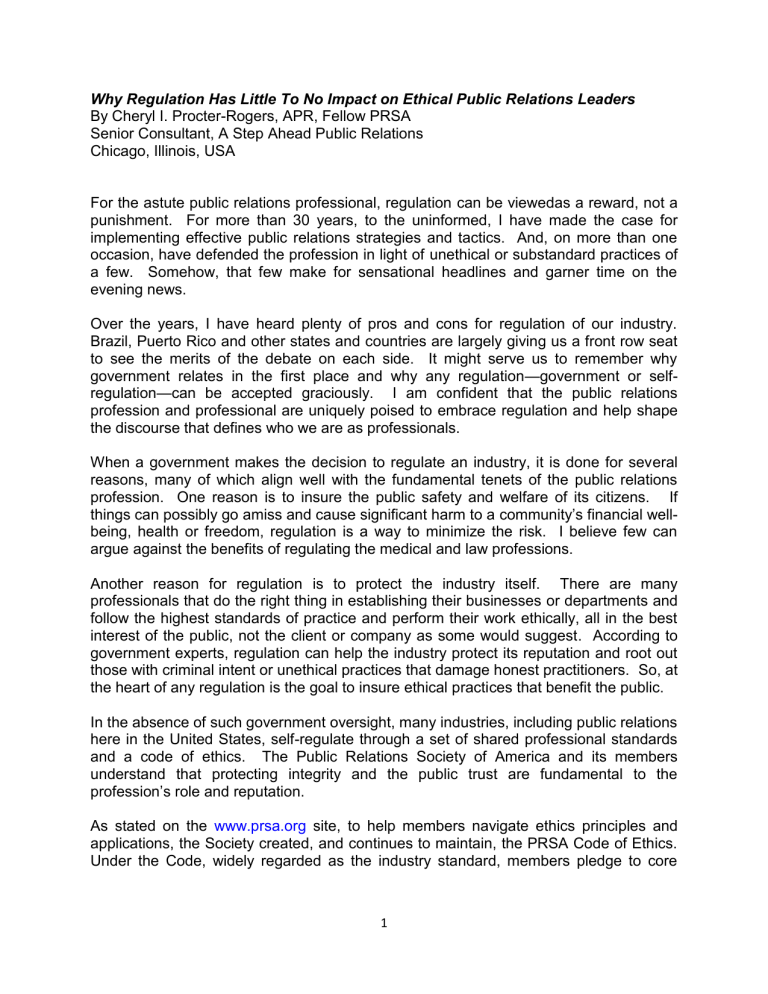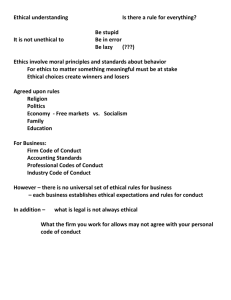REGULATIONS AND THE ETHICAL PR LEADER

Why Regulation Has Little To No Impact on Ethical Public Relations Leaders
By Cheryl I. Procter-Rogers, APR, Fellow PRSA
Senior Consultant, A Step Ahead Public Relations
Chicago, Illinois, USA
For the astute public relations professional, regulation can be viewedas a reward, not a punishment. For more than 30 years, to the uninformed, I have made the case for implementing effective public relations strategies and tactics. And, on more than one occasion, have defended the profession in light of unethical or substandard practices of a few. Somehow, that few make for sensational headlines and garner time on the evening news.
Over the years, I have heard plenty of pros and cons for regulation of our industry.
Brazil, Puerto Rico and other states and countries are largely giving us a front row seat to see the merits of the debate on each side. It might serve us to remember why government relates in the first place and why any regulation —government or selfregulation
—can be accepted graciously. I am confident that the public relations profession and professional are uniquely poised to embrace regulation and help shape the discourse that defines who we are as professionals.
When a government makes the decision to regulate an industry, it is done for several reasons, many of which align well with the fundamental tenets of the public relations profession. One reason is to insure the public safety and welfare of its citizens. If things can possibly go amiss and cause significant harm to a community’s financial wellbeing, health or freedom, regulation is a way to minimize the risk. I believe few can argue against the benefits of regulating the medical and law professions.
Another reason for regulation is to protect the industry itself. There are many professionals that do the right thing in establishing their businesses or departments and follow the highest standards of practice and perform their work ethically, all in the best interest of the public, not the client or company as some would suggest. According to government experts, regulation can help the industry protect its reputation and root out those with criminal intent or unethical practices that damage honest practitioners. So, at the heart of any regulation is the goal to insure ethical practices that benefit the public.
In the absence of such government oversight, many industries, including public relations here in the United States, self-regulate through a set of shared professional standards and a code of ethics. The Public Relations Society of America and its members understand that protecting integrity and the public trust are fundamental to the profession’s role and reputation.
As stated on the www.prsa.org
site, to help members navigate ethics principles and applications, the Society created, and continues to maintain, the PRSA Code of Ethics.
Under the Code, widely regarded as the industry standard, members pledge to core
1
values, principles and practice guidelines that define their professionalism and advance their success.
The Code, created and maintained by the PRSA Board of Ethics and Professional
Standards (BEPS), sets out principles and guidelines built on core values. Fundamental values like advocacy, honesty, loyalty, professional development and objectivity structure ethical practice and interaction with clients and the public.
Translating values into principles of ethical practice, the Code advises professionals to:
Protect and advance the free flow of accurate and truthful information.
Foster informed decision making through open communication.
Protect confidential and private information.
Promote healthy and fair competition among professionals.
Avoid conflicts of interest.
Work to strengthen the public’s trust in the profession.
Code guidelines, like tactics supporting strategies, zero in on putting value and principles into play for working professionals facing everyday tasks and challenges.
Among them, professionals should:
Be honest and accurate in all communications.
Reveal sponsors for represented causes and interests.
Act in the best interest of clients or employers.
Disclose financial interests in a client’s organization.
Safeguard the confidences and privacy rights of clients and employees.
Follow ethical hiring practices to respect free and open competition.
Avoid conflicts between personal and professional interests.
Decline representation of clients requiring actions contrary to the Code.
Accurately define what public relations activities can accomplish.
Report all ethical violations to the appropriate authority.
Armed with a professional code of ethics and guiding principles, how do we insure we have the essential leadership skills to help shape the discourse that brings credibility to our industry? How do we emerge as ethical leaders? Ethical leadership isn’t about just being a good person and having good intentions. It is far more complex and is purposeful. It doesn’t happen by accident.
Ethical leaders seek out employers or clients that align with their own personal set of values and beliefs. This is the criteria for accepting a position or taking on a new client. The public relations leader knows that it is not only important to tell a compelling story, but also to embody and live the story. So it is with ethical leaders.
Ethical leaders understand their role within the larger framework of the organization and to its publics. It is not about the leader as an individual or his/her ego, it is about something
2
biggerthan themselves
—the goals and mission of the organization. So it is with the public relations professional.
Ethical leaders embrace diversity and understand whengiven the same information, each individualmay see things differently. Much like the public relations professional, ethical leaders refuse to be trapped by confirmation bias —that is, only reading material, only attending events, only joining organizations, only hiring employees that speak to their own backgrounds, experiences and beliefs. Diversity is a strategy and a way of life for both the public relations professional and the ethical leader.
The public relations professional and ethical leader advocate for transparent, two-way communication. They insist that all decisions are made through open channels and consider all points of view. They walk the talk and are committed to behaviors and values that align with the greater good.
In essence, regulation, while not perfect, signals to the world that this is a profession that has a significant impact on the public trust and has a reputation to protect. And for this public relations professional, I would accept the reward graciously, for now…
11.2011
3








